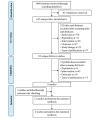Effectiveness and Safety of Using Chatbots to Improve Mental Health: Systematic Review and Meta-Analysis
- PMID: 32673216
- PMCID: PMC7385637
- DOI: 10.2196/16021
Effectiveness and Safety of Using Chatbots to Improve Mental Health: Systematic Review and Meta-Analysis
Abstract
Background: The global shortage of mental health workers has prompted the utilization of technological advancements, such as chatbots, to meet the needs of people with mental health conditions. Chatbots are systems that are able to converse and interact with human users using spoken, written, and visual language. While numerous studies have assessed the effectiveness and safety of using chatbots in mental health, no reviews have pooled the results of those studies.
Objective: This study aimed to assess the effectiveness and safety of using chatbots to improve mental health through summarizing and pooling the results of previous studies.
Methods: A systematic review was carried out to achieve this objective. The search sources were 7 bibliographic databases (eg, MEDLINE, EMBASE, PsycINFO), the search engine "Google Scholar," and backward and forward reference list checking of the included studies and relevant reviews. Two reviewers independently selected the studies, extracted data from the included studies, and assessed the risk of bias. Data extracted from studies were synthesized using narrative and statistical methods, as appropriate.
Results: Of 1048 citations retrieved, we identified 12 studies examining the effect of using chatbots on 8 outcomes. Weak evidence demonstrated that chatbots were effective in improving depression, distress, stress, and acrophobia. In contrast, according to similar evidence, there was no statistically significant effect of using chatbots on subjective psychological wellbeing. Results were conflicting regarding the effect of chatbots on the severity of anxiety and positive and negative affect. Only two studies assessed the safety of chatbots and concluded that they are safe in mental health, as no adverse events or harms were reported.
Conclusions: Chatbots have the potential to improve mental health. However, the evidence in this review was not sufficient to definitely conclude this due to lack of evidence that their effect is clinically important, a lack of studies assessing each outcome, high risk of bias in those studies, and conflicting results for some outcomes. Further studies are required to draw solid conclusions about the effectiveness and safety of chatbots.
Trial registration: PROSPERO International Prospective Register of Systematic Reviews CRD42019141219; https://www.crd.york.ac.uk/prospero/display_record.php?ID=CRD42019141219.
Keywords: anxiety; chatbots; conversational agents; depression; effectiveness; mental disorders; mental health; safety.
©Alaa Ali Abd-Alrazaq, Asma Rababeh, Mohannad Alajlani, Bridgette M Bewick, Mowafa Househ. Originally published in the Journal of Medical Internet Research (http://www.jmir.org), 13.07.2020.
Conflict of interest statement
Conflicts of Interest: None declared.
Figures





References
-
- Mental Health Foundation . Fundamental Facts About Mental Health 2016. London: Mental Health Foundation; 2016. [2020-06-08]. https://www.mentalhealth.org.uk/sites/default/files/fundamental-facts-ab....
-
- Mental Health Foundation . Fundamental Facts About Mental Health 2015. London: Mental Health Foundation; 2015. [2020-06-08]. https://www.mentalhealth.org.uk/sites/default/files/fundamental-facts-15....
-
- Whiteford HA, Ferrari AJ, Degenhardt L, Feigin V, Vos T. The global burden of mental, neurological and substance use disorders: an analysis from the Global Burden of Disease Study 2010. PLoS One. 2015 Feb;10(2):e0116820. doi: 10.1371/journal.pone.0116820. http://dx.plos.org/10.1371/journal.pone.0116820 - DOI - PMC - PubMed
Publication types
MeSH terms
LinkOut - more resources
Full Text Sources
Medical

